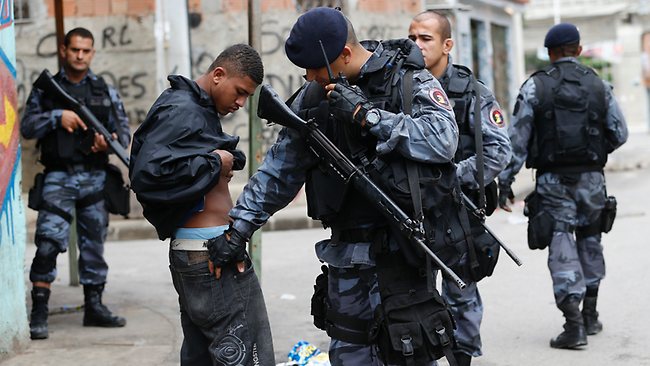A new report by a citizen security body in Brazil says that police have killed more than 11,000 civilians in the past five years — while the number of police killed during the same period nearly doubled — suggesting strategies aimed at lowering police brutality have not had the intended effect.
The report (pdf) published by the Brazilian Forum on Public Security — a body comprised of security officials, research centers, and NGOs — counted 11,197 citizen deaths perpetrated by both on and off-duty police in the country from 2009 to 2013, representing an average of 2,239 people killed by police per year over that period (see graph).

The highest number of reported police killings in this time frame was in 2010, with 2,434 cases, while the lowest number occurred the following year, with 2,042.
According to the report, the vast majority of killings are committed by military police. This body was responsible for 1,567 citizen deaths in 2013, compared to just 198 cases of fatal confrontations between civil police and civilians. On the flip side, military police are also over four times more likely to be killed than civil police.
SEE ALSO: Brazil News and Profiles
Meanwhile, the number of Brazilian police officers reported killed rose from 264 in 2009 to 490 in 2013, with a total of 1,770 killed over the five-year period (see graph). This increase was primarily attributable to a steady climb in deaths of off-duty police between 2011 and 2013. These off-duty police were about three times more likely to be killed than their on-duty counterparts in 2013.

Rio de Janeiro was the most dangerous place to be a police officer in Brazil in 2013, with 104 police officers either injured or killed, followed by São Paulo, which reported 90 police injuries or deaths that year.
InSight Crime Analysis
Despite various reforms aimed at reducing police brutality, Brazil continues to struggle with this problem. Measures taken so far include more community police and training. Cameras have also been installed in some police cars — such as the one that caught now-imprisoned Rio officers in the act of bringing two youths to the top of a mountain before allegedly executing one and severely wounding the other — and there are plans to install 2,000 more in military police vehicles by the end of 2014.
Meanwhile, authorities in São Paulo state — where military police have reportedly killed more than 10,000 people over the last 20 years — passed a resolution in 2013 prohibiting police from taking crime scene victims to the hospital, in order to cut down on police tampering with evidence.
SEE ALSO: Coverage of Police Reform
Brazil’s Human Rights Defense Council has called on police in the past to better investigate police killings. Nonetheless, the measures enacted until now have clearly fallen short. Reports continue to surface of police committing revenge attacks and falsely claiming suspects were killed after resisting arrest, while corrupt police in Rio are known to be involved in the city’s criminalized militia groups.
Experts say the violence is linked partly to an ingrained notion that executing suspected criminals is acceptable police behavior. The Rio shooting referenced above certainly lends creedence to this notion: A video of the police in their vehicle with the youths documents the nonchalant way in which the officers taunt their would-be victims on the way to their execution.
The report also reveals a disturbing trend on the other end of police-related violence in Brazil. The growing number of off-duty police officers killed in the last two years could be related, as the reports suggests, to officers living in poor neighborhoods attempting to stop crime on their days off. However, it could also be linked to conflict between police and criminal groups, such as a particularly brutal round of fighting with São Paulo’s First Capital Command (PCC) in 2012. Criminal groups may see off-duty officers as easy targets for attacks.
The high levels of police violence in Brazil have contributed to what the authors of the report call an “endemic crisis” of citizen security in the country. Heavy-handedness by police has helped produce widespread distrust in the institution, which in turns leads to underreporting of criminal activity. This presents a major obstacle to reducing violent crime.

